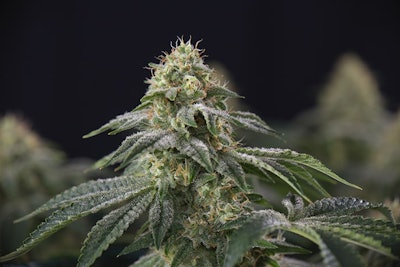
Editor's note: Robert C. Clarke, cannabis researcher and Cannabis Business Times columnist, shares his thoughts on why he resigned from the Phylos Bioscience Scientific Advisory Board in the wake of the company's announcement to start a breeding program. As the news prompts conversations about cannabis genetics research and intellectual property protection across the industry, Clarke wished to make his thoughts public.
This short message marks my resignation from the Phylos Bioscience Scientific Advisory Board. In recent weeks it has become increasingly apparent that we no longer share the same research goals, and I am very sorry it worked out this way for all concerned.
I support Cannabis science on many fronts, and I will continue to push Cannabis science into the forefront. Exploring and understanding the genome are key steps in realizing the great potentials of Cannabis and many other crop plants. Those who believe in progressive science accept that the study of inheritance is important to the future of developing successful cultivars, and that genomics offers extremely valuable tools. Research concerning the Cannabis plant has largely been ignored by governments and in turn academic institutions, and the responsibility for cannabis-related R&D now lies firmly within the private business sector. Businesses aim to make profits, and this core motive will drive cannabis science for the foreseeable future.
Members of our cannabis community chose various paths in relation to Phylos Bioscience. My decision to engage was based on scientific interest. Many of us assumed that Phylos would follow its somewhat predictable economic path towards becoming a variety breeding company and nursery. Therefore, I did not supply the company with live seeds, as live seeds were not needed for its phylogenetic research anyway. Others chose a different path and intentionally aligned themselves with Phylos, providing the company with their cherished varieties with the hope of assisting it with commercial cultivar selections and eventual breeding projects. Others formed differing relationships all with the best of intentions, just trying to do the right thing.
Then, Phylos changed its public face and insulted the community whose trust it had garnered by suddenly providing duplicitous explanations of its varied intents. Its actions raised simple questions: “Is Phylos working for me, the boutique grower, by protecting my hard-won heritage with their Galaxy? Or, do they have a hidden agenda?” Most insulting was Phylos discounting the crowd-sourced science and personal initiative that produced our amazingly diverse Cannabis cultivars. Without the international culture of clandestine cannabis growers and breeders, Phylos and other Cannabis genomics companies would have little space to occupy today.
My personal disappointment, which is shared by many whom I persuaded to submit samples, is that Phylos was unable to carry out the science it initially planned. Corporate interests ruled and their basic research was delayed. Driven by scientific curiosity, we all looked forward to the possibility that DNA sequencing might add to our phylogenetic knowledge and shed light on the history and relatively recent domestication of present-day cultivars. Many took an interest and we solicited samples primarily of landraces from foreign sources and their very early hybrids – the exotic building blocks of modern sinsemilla cultivars – especially samples that pre-dated or were isolated from the rampant spread of “Dutch” seeds. About half the samples submitted with this intent were sequenced and added to the Phylos Galaxy the optical results to be shared by all. Should the task be completed one fine day, we may then realize the insights we all yearn for.
There exists a persistent yet nebulus feeling amongst members of our community that raw Cannabis genome data is of great value, and possibly someday it will be of great value, but to say that data Phylos collected from donated samples is of great value would be speculative at best. There is great anticipation surrounding the advances in variety improvement that will be made using the potentially powerful tool of marker-assisted breeding to isolate the genes for rare traits. Marker-assisted breeding relies on phenotype data characterizing the plants the genomic data is collected from. It is difficult to find genetic markers for a trait in the absence of a plant that expresses that trait. Without phenotype data the genomic data is debased and of less value to variety development research. This is why genomics companies will all end up either growing their own plants and collecting their own genomic data (or contracting someone else to do it for them) to support their variety improvement programs.
As a technological species we rely heavily on science, yet many in today’s world doubt its veracity and honesty. Phylos bridged the divide between the cannabis community and rigorous science and made that science accessible and compelling to many. And then it torched that bridge. Not only were people disappointed by Phylos—Phylos discolored its feelings about science as well. However, those who distrust the alliance of science and industry have much more powerful and potentially evil companies to fear, and we should all come to grips with the emotionally sensitive issues surrounding how we feel about the inevitable influences of agribusiness impinging on our futures.
In closing, I must add that I find the behavior of some members of our cannabis community quite disappointing. Scanty information concerning sensitive topics can prove a dangerous thing, and it is far too cheap and easy to point accusing fingers through the hazy smog of the Internet. Once again, well-meaning people are being dragged onto the smoldering pyre of conspiracy theories by rabid cannabis reactionaries unfairly accusing them of collaborating with an imaginary enemy. Most of those chased by the lynch mob of unfounded public opinion survived decades of prohibition, devoted much of their lives to pushing our knowledge of the Cannabis plant to new limits, and remain dedicated allies of our favorite plant to this day. Taking them to task over problems created by Phylos is additionally disrespectful of our community. Do you support such allegations, or do you prefer that logic reassert itself?
All I hope for is that lessons will be learned by all involved, and that Cannabis-based science will proceed hand-in-hand with both successful business models and heightened social awareness. Science marches on, so let’s make the best of it.

























